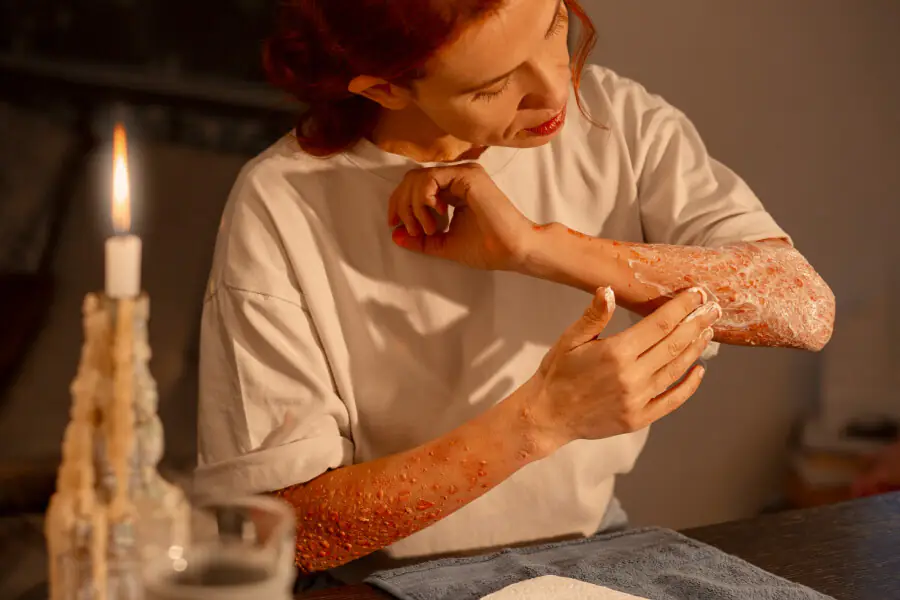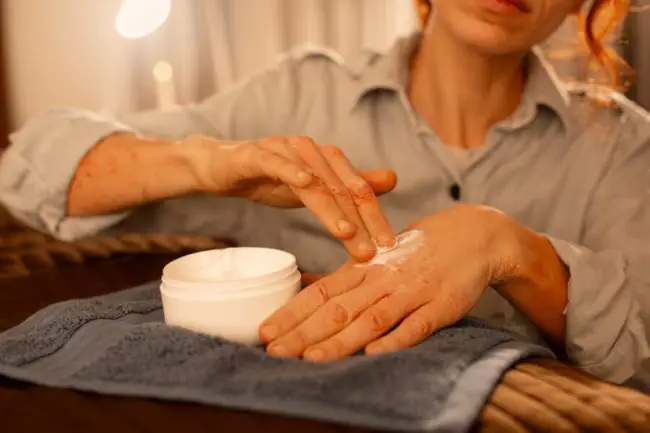Struggling with atopic skin? You’re not alone! Many people are searching for effective ways to manage and prevent flare-ups of conditions like eczema. You can everything you need to know about treating atopic dermatitis.
From identifying triggers to lifestyle changes, we’ve got you covered with practical tips and natural remedies to keep your skin healthy and happy.
What is Atopic Dermatitis?
Atopic dermatitis, or atopic skin, is a chronic inflammatory skin condition that primarily affects the skin’s barrier function.
This can lead to symptoms like dryness, itching, and inflammation. It often starts in childhood but can continue into adulthood.
Individuals with atopic dermatitis may experience flare-ups that can significantly impact their quality of life, making effective management essential.
Who is at Risk for Atopic Dermatitis?
Anyone can develop atopic skin, but certain factors can increase your risk:
- Genetics: A family history of atopic skin conditions, such as asthma or hay fever, can make you more susceptible.
- Age: While it commonly appears in babies and children, it can persist or develop later in life.
- Environmental Factors: Exposure to allergens, irritants, and pollutants can exacerbate atopic skin conditions.
Understanding these risk factors can help you take proactive steps in managing your condition.
Identifying Triggers
Identifying the triggers of atopic skin flare-ups is important for effective management. By understanding what increases your symptoms, you can take steps to minimize exposure and prevent future flare-ups.
Common Triggers of Atopic Dermatitis
- Irritants: Soaps, detergents, and certain fabrics can irritate atopic skin. Avoid harsh products and go for gentle, fragrance-free alternatives.
- Allergens: Dust mites, pet dander, pollen, and mold are common allergens that can trigger flare-ups. Keeping your home clean and allergen-free can help.
- Weather Conditions: Extreme temperatures, humidity, and dry air can worsen your condition. Be mindful of weather changes and adjust your skincare routine accordingly.
- Stress: Emotional stress can trigger or worsen symptoms of atopic skin. Finding healthy ways to manage stress is essential for overall skin health.
Treating Atopic Dermatitis
When it comes to treating atopic dermatitis, a multifaceted approach is often the most effective. Here are some techniques to help manage your symptoms:
Moisturizing Techniques for Atopic Skin
One of the key aspects of managing atopic skin is keeping it moisturized. Here are some tips:
- Choose the Right Moisturizer: Look for products labeled “fragrance-free” and “hypoallergenic.” Creams and ointments are often more effective than lotions for locking in moisture.
- Moisturize After Bathing: Apply moisturizer immediately after bathing to seal in moisture. This practice is especially important for those with sensitive atopic skin.
Topical Treatments for Flare-Ups
For managing flare-ups of atopic skin, topical treatments can be beneficial:
- Creams that can help reduce inflammation and itching during flare-ups.
- Creams that can be effective for sensitive areas like the face and eyelids.
Always follow your doctor’s recommendations regarding strength and frequency of use.
Oral Medications for Severe Symptoms
In cases where topical treatments are insufficient, your doctor may prescribe oral medications to help control inflammation and itching. Options may include treatments for severe flare-ups of atopic skin.
Preventing Flare-Ups
Prevention is key when it comes to managing atopic skin. Here are some tips to keep your skin healthy:
Skin Care Routine Tips for Atopic Skin
- Establish a Daily Routine: Consistency is vital for managing your atopic skin. Develop a daily skincare routine that includes gentle cleansing and moisturizing.
- Use Mild, Unscented Products: Go for gentle cleansers and avoid harsh soaps and scrubs that can irritate your condition.
Dietary Changes to Support Healthy Skin
Your diet can play a significant role in the health of your atopic skin. Consider adding:
- Omega-3 Fatty Acids: Found in fish, flaxseeds, and walnuts, omega-3s can help reduce inflammation.
- Probiotics: Foods like yogurt and fermented products may support gut health and improve your atopic skin condition.
Stress Management for Atopic Dermatitis
Since stress can trigger flare-ups, finding ways to manage it is essential. Consider practices such as:
- Yoga and Meditation: These can help calm your mind and reduce stress related to your atopic dermatitis condition.
- Regular Exercise: Physical activity can improve mood and reduce stress, contributing to healthier skin.
When to Seek Doctor’s Help
Signs That You Should Consult a Dermatologist
If your atopic skin condition becomes severe or doesn’t improve with over-the-counter treatments, it may be time to consult a dermatologist. Signs that indicate a need for professional help include:
- Persistent itching that interferes with daily life
- Severe redness or swelling
- Signs of infection (such as oozing or crusting)
Treatment Options from Specialist Doctors
Dermatologists can provide personalized treatment plans and may recommend advanced therapies, such as:
- Phototherapy: Exposure to controlled doses of ultraviolet light can help reduce inflammation in atopic skin.
- Biologic Medications: For severe cases, biologics may be prescribed to target specific pathways in the immune system affecting your atopic skin.
Lifestyle Adjustments for Long-Term Relief
Creating a Skin-Friendly Environment at Home
Make adjustments in your living space to minimize exposure to triggers affecting your atopic skin condition:
- Use Air Purifiers: This can help reduce allergens like dust mites and pet dander.
- Control Humidity: Maintaining a balanced humidity level can prevent your atopic skin from drying out.
Exercise and Atopic Dermatitis: Best Practices
While exercise is beneficial for overall health, certain activities can trigger flare-ups due to sweat or irritation. Consider these tips:
- Choose Comfortable Clothing: Wear breathable, loose-fitting clothes during workouts to protect your atopic dermatitis.
- Shower Immediately After Exercise: This can help wash away sweat and prevent irritation.
Managing Atopic Skin in Different Seasons
Your atopic skin may react differently throughout the year:
- Winter: Use a humidifier to combat dry air and increase moisture levels in your home.
- Summer: Protect your skin from the sun and avoid overheating, as excessive sweating can trigger flare-ups.
Conclusion
Managing atopic skin requires a comprehensive approach that includes understanding triggers, following a dedicated skincare routine, and making lifestyle adjustments. By taking proactive steps, you can minimize flare-ups and maintain healthier skin.
Remember that while atopic skin can be challenging, you don’t have to face it alone. Consult with healthcare professionals to find the best treatment options for your individual needs and keep your condition in check.
FAQs
How to prevent atopic dermatitis flare-ups?
Preventing flare-ups involves identifying and avoiding triggers, maintaining a regular skincare routine, and managing stress effectively.
How to stop the skin from flaring up?
Moisturizing regularly, using gentle skincare products, and addressing environmental factors can help stop flare-ups.
Why does my atopic dermatitis keep coming back?
Your atopic dermatitis condition is chronic and can be influenced by various factors, including environmental triggers, genetics, and stress.
How do you permanently treat atopic dermatitis?
While there is no permanent cure, effective management strategies can help control symptoms and reduce the frequency of flare-ups of atopic dermatitis.







